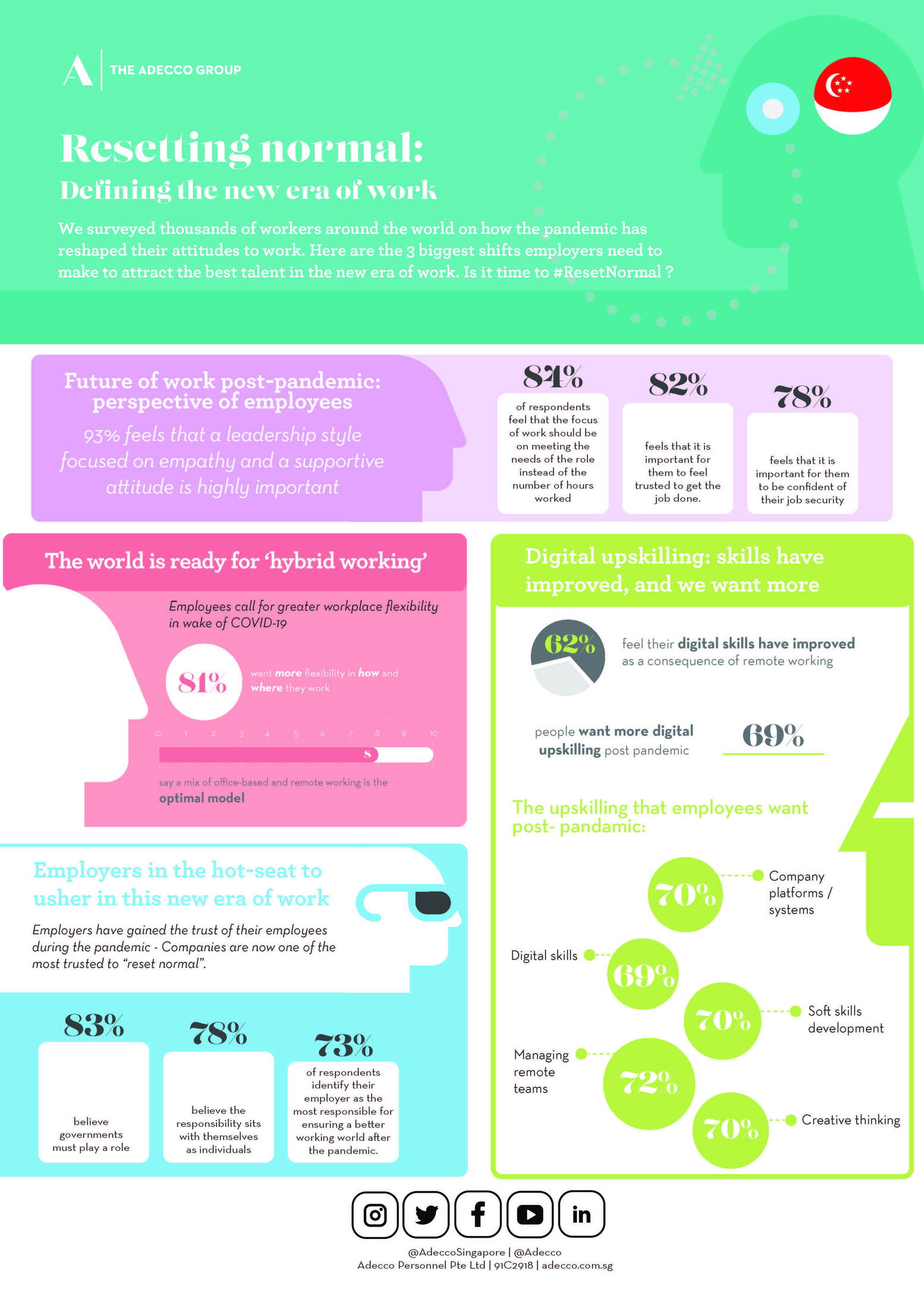share on
The coronavirus pandemic has impacted all corners of our world, creating pivotal shifts in attitudes and expectations among workers and leaders.
For instance, according to a recent study conducted by The Adecco Group, the pandemic may signal the end of the traditional 9 to 5 work hours.
The study, surveying 1,500 workers across Asia, found that nearly 70% of respondents claimed they would like more flexibility and autonomy over their own working schedules.
At the same time, over 30% of respondents said that they would like to spend at least half of their working hours working remotely from home.
A majority of the respondents (74%) claimed that they agree that the increased flexibility in working patterns will make jobs in their profession accessible to more people compared to before the pandemic. While 81% of respondents agreed that both individuals and businesses will benefit from allowing increased flexibility around office and remote working.
The wish for more flexibility may be a result of 80% coming to the realisation that maintaining a good work-life balance is the most important for them after the pandemic.
The Adecco Group also uncovered an unintended consequence of lockdown - the increase in demand for upskilling and reskilling, with nearly 77% of respondents deemed remote working skills and digital training as highly important.
The pandemic also demanded a new set of leadership competencies that are expected to accelerate a reinvention of the modern-day leader. Emotional intelligence has clearly emerged as the defining trait of today's successful manager, with 82% of respondents across APAC claiming that a leadership style focused on empathy and a supportive attitude is highly important.
When it comes to ensuring a better working world, respondents across Asia believe that government, employers and individuals hold almost equal responsibility.
Interestingly, the wider global survey found that respondents put more emphasis on the responsibility of their employers to ensure a better world of work, with 80% believing they held responsibility compared to only 68% across Asia.
Finally, the findings also highlighted the importance of sustaining trust in the new working world. When asked the level of trust that respondents have towards different stakeholders, 70% claimed to have high trust in the government to support them during a future pandemic.
This is in stark contrast to the global results where only 42% of respondents trusted in their governments to support them, indicating that Asia’s government response to COVID-19 has been well received by individuals.
Ian Lee, CEO of The Adecco Group APAC, said: "COVID-19 has prompted businesses to rethink how they operate, as well as to restructure how they approach employee relationships with work, technology and the wider society. We will eventually come to the end of the COVID-19 tunnel, but what we know for sure is that the world of work will never return to the pre-pandemic standard of normalcy.
"To transform rather than survive through the crisis, businesses must seize this unprecedented opportunity to ‘reset normal’ to create a more inclusive and productive world of work. This means listening to the voices of people and establishing norms that cater for their betterment, even if it requires them to break-through traditional boundaries.”
Zooming in on the Singapore specific findings:
- 81% would like more flexibility in how and where they work.
- 81% of the respondents felt that it’s good to have a mixture of office and remote working.
- 82% felt that flexibility around work and remote working will be beneficial.
- 84% of respondents felt that the focus of work should be on meeting the needs of the role instead of the number of hours worked.
- 62% felt that their digital skills have improved as a consequence of remote working, with 69% wanting more digital upskilling post-pandemic.
- 72% would like to enhance their skills in managing remote teams, followed by 70% company platforms/ systems, 70% in soft skills development and 70% in creative thinking.
- A leadership style focused on empathy and a supportive attitude ranked the highest at 93%.
- 82% felt that it is important for them to feel trusted to get the job done.
- 78% felt that it is important for them to be confident of their job security.
- 83% stated that the country government is responsible for ensuring a better working world, 78% said that it is one’s individual responsibility and 73% felt the employer is responsible.
Betul Genc, Country Manager of Adecco Singapore, added: "The decisions made by employers today will influence their status as an employer of choice for many years to come. The war for talent will be won and lost on the battlegrounds of flexibility, skills investment, leadership and trust. The organisations that are able to 'reset normal' on these four dimensions will not only secure the best talent, but will also be the most effective in managing their human capital to create sustainable success for their organisations, for the individuals they employ, and for society at large.”

Infographic and lead image / Adecco Group
share on
Follow us on Telegram and on Instagram @humanresourcesonline for all the latest HR and manpower news from around the region!
Related topics


